

Against Environmental Pessimism. We’ve just had the best decade in human history. Seriously. Let nobody tell you that the second decade of the 21st century has been a bad time.
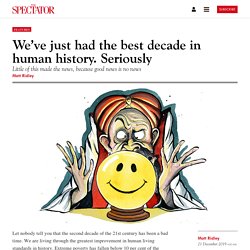
We are living through the greatest improvement in human living standards in history. Extreme poverty has fallen below 10 per cent of the world’s population for the first time. It was 60 per cent when I was born. Global inequality has been plunging as Africa and Asia experience faster economic growth than Europe and North America; child mortality has fallen to record low levels; famine virtually went extinct; malaria, polio and heart disease are all in decline. HumanProgress. How Julian Simon Defeats Thanos. “The universe is finite, its resources finite.

If life is left unchecked, life will cease to exist.” With those simple words, the Marvel supervillain Thanos justifies slaughtering multitudes, supposedly for the greater good of saving whatever life may remain in the universe, in “Avengers: Infinity War.” Thanos returns to movie theaters today, as Captain America, Iron Man, and their fellow superheroes try to thwart his murderous plans. But meanwhile, back in the real world, pundits and academics such as Paul Ehrlich, perhaps the world’s leading population alarmist, are often feted as Jeremiahs bravely warning of our impending doom, as they peddle notions not unlike Thanos’s vision—ideas that have helped justify policies like mandatory sterilization and China’s one-child rule.
Thankfully, the population doomsayers have met their match in one real-life avenger, whom CEI is proud to honor with an award in his name. Pooley and Tupy conclude with a less obvious but apt analogy. Study shows global forest loss over past 35 years has been more than offset by new forest growth. A team of researchers from the University of Maryland, the State University of New York and NASA's Goddard Space Flight Center has found that new global tree growth over the past 35 years has more than offset global tree cover losses.
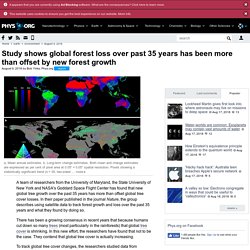
In their paper published in the journal Nature, the group describes using satellite data to track forest growth and loss over the past 35 years and what they found by doing so. There has been a growing consensus in recent years that because humans cut down so many trees (most particularly in the rainforests) that global tree cover is shrinking. In this new effort, the researchers have found that not to be the case. They contend that global tree cover is actually increasing. To track global tree cover changes, the researchers studied data from advanced very high-resolution radiometers aboard a series of 16 weather satellites covering the years 1982 to 2016.
Explore further: Cities and communities in the US losing 36 million trees a year. The World's Poorest People Are Getting Richer Faster than Anyone Else. Human Progress: The Most Important (and Under-Reported) Fact in Modern History. The World's Getting Better All the Time. New at HumanProgress - click here to check out Your Life in Numbers.
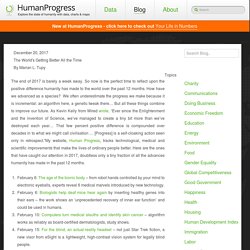
40 Ways the World Is Getting Better. Koroleva Irina/flickrOne of the reasons for starting Human Progress in 2013 was to allow the users of the website to see the multitude of ways in which the state of humanity was improving.
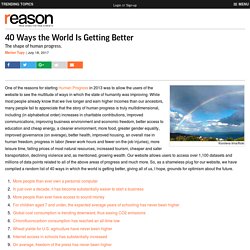
While most people already know that we live longer and earn higher incomes than our ancestors, many people fail to appreciate that the story of human progress is truly multidimensional, including (in alphabetical order) increases in charitable contributions, improved communications, improving business environment and economic freedom, better access to education and cheap energy, a cleaner environment, more food, greater gender equality, improved governance (on average), better health, improved housing, an overall rise in human freedom, progress in labor (fewer work hours and fewer on-the-job injuries), more leisure time, falling prices of most natural resources, increased tourism, cheaper and safer transportation, declining violence and, as mentioned, growing wealth.
16 Things That Prove The World Is Getting Better, Not Worse. China's Poverty Is Dropping At an Unprecedented Rate. Why the World Is Better Than You Think in 10 Powerful Charts. 9 ways the world got a lot better in 2017. There has been a lot of bad news in America this year, and people are noticing: In December, 60 percent of US respondents felt the country was on the wrong track.

The angst isn’t unique to the US. Across 26 countries that are home to the considerable majority of the world’s population, an average of six out of 10 people thought their country was on the wrong track (as of the middle of 2017). That’s more surprising than the US result because, despite the threats posed by the world’s sole superpower going rogue — admittedly no small problem — the planet as a whole had a pretty good year. An economic lesson worth remembering: Communism was pretty terrible. Much of my writing is about the transformative power of innovative, market capitalism.

But maybe it would be worthwhile to expend a few more words on the alternative. What about the terrible history of centrally planned economies? Apparently the great lessons from those experiences must be relearned. I mean, clearly the message isn’t getting through when some folks — as I’ve seen on Twitter — can look at a chart showing the steep decline in global poverty and view it as an endorsement of the Chinese communist party rather than market reforms and decentralization.
Yet as noted in the new paper “From workers to capitalists in less than two generations” by Li Yang, Filip Novokmet, and Branko Milanovic, China’s economic transformation is “a unique event in world economic history: never have so many people over such a relatively short period of time increased their income so much.” The Positive Impact of Human CO2 Emissions on the Survival of Life on Earth.
Julian Simon Was Right: A Half-Century of Population Growth, Increasing Prosperity, and Falling Commodity Prices. How can one explain this unprecedented improvement in global well-being?
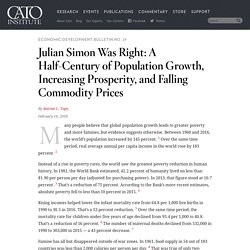
Some of it must be attributed to technological and scientific progress. Also, specialization and trade played a vital role in improving the state of the world. Dear Parkland Kids: We Gave You An Awesome World, Don't Mess It Up. All the reasons for refusing to allow ourselves to be led by children were summed up in the latest coronation of the Parkland kids, this time by ancient leftist Bill Maher.

He invited David Hogg and Cameron Kasky on his show so Hogg could boast about hanging up on the President of the United States, and so Kasky could give us this sanctimonious little lecture: “I mean this sincerely, I really do, to all the generations before us, we sincerely accept your apology. We appreciate that you are willing to let us rebuild the world that you f—ed up.” This sums up everything that’s wrong with these kids’ astroturfed ride to fame. They get flown around the country, they get invited on TV, they get puffball interviewers like Bill Maher, all because they are willing to repeat in a cloyingly self-righteous manner the message favored by their adult handlers. But not because they actually know what they’re talking about. Start with the issues most directly at hand here. And so on. Hans Rosling's 200 Countries, 200 Years, 4 Minutes - The Joy of Stats - BBC Four.
Infant Mortality Rates. Life Expectancy.